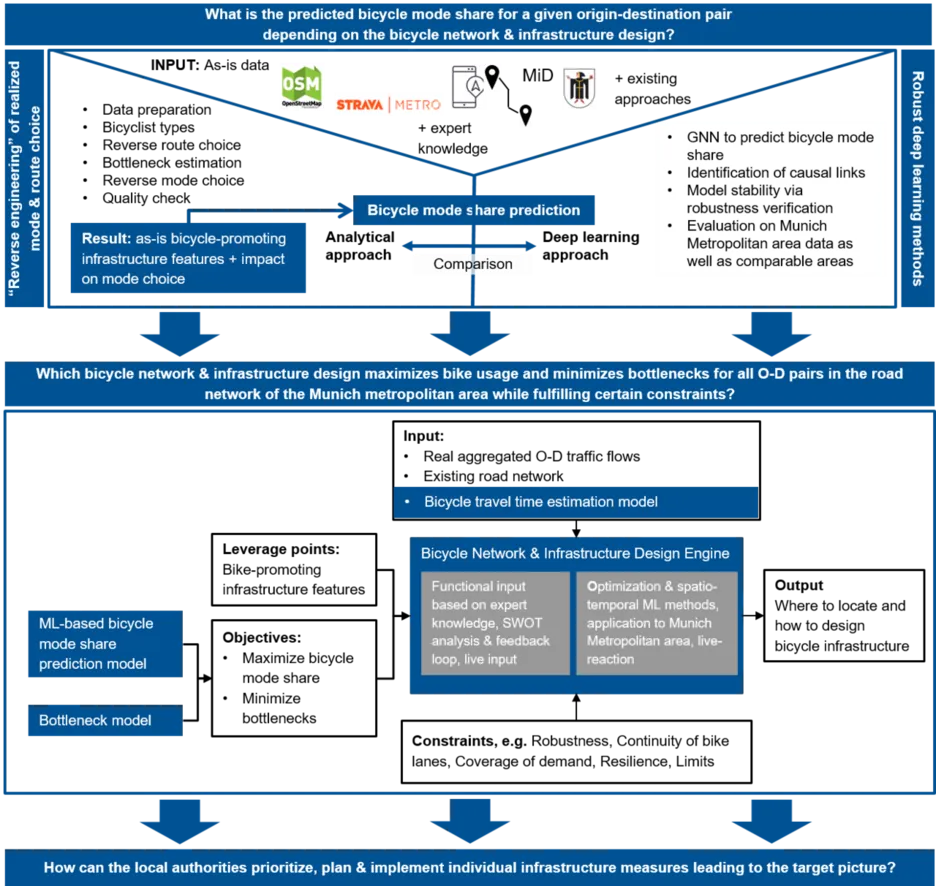RADELN (Bicycle infrastructure & network design – a human-centric, data-driven approach using spatio-temporal machine learning)
Project Description
We develop a human-centric, data-driven approach for finding optimal bicycle infrastructure and network designs for metropolitan regions that help to shift trips from cars to bicycles. The framework exploits all modal shift potentials by incorporating trips of longer distances (e.g. commuters from/to suburban areas) and by differentiating the heterogeneous preferences of previously identified bicyclist types. In order to predict the impact of trip-specific bicycle infrastructure features on bicycle mode share as realistically as possible, we first reverse engineer the actual realized route and mode choice based on real data (e.g. origin-destination modal splits derived from mobile cell phone data, bicycle GPS trajectories). We also develop a data-driven model for bottleneck identification in existing bicycle networks. In all our models we incorporate expert knowledge and benchmark the quality of results with already existing approaches. The project develops, evaluates and compares analytical as well as robust spatio-temporal machine learning (ML) methods. Within a field study, we apply the approach to the Munich metropolitan area. We propose a bicycle infrastructure plan that helps authorities to sequentially implement individual measures leading to the modelled optimal bicycle infrastructure and network design. Finally, this plan is matched and compared with Munich's existing bicycle infrastructure plans and developments. Summing up, our approach will sustainably promote bicycle traffic on a larger scale and will thus increase public health [1] and decrease emissions, air pollution and space consumption [2].
[1] Pucher, J., Buehler, R., Bassett, D. R., & Dannenberg, A. L. (2010). Walking and cycling to health: a comparative analysis of city, state, and international data. AJPH, 100(10), 1986–1992.
[2] Neves, A., & Brand, C. (2019). Assessing the potential for carbon emissions savings from replacing short car trips with walking and cycling using a mixed GPS-travel diary approach. TR Part A, 123, 130-146.
Tasks of the Chair
The Chair of Traffic Engineering is responsible for the overall project coordination. The research focus is on developing analytical approaches for bicycle mode and route choice as well as for bicycle network and infrastructure optimization, the integration of expert knowledge into all parts of the project as well as the final case study for the city of Munich.
| Keywords | active mobility, bicycle, data-driven network optimization, machine learning, artificial intelligence |
| Funding | TUM Georg Nemetschek Institute Artificial Intelligence for the Built World |
| Website | https://www.mdsi.tum.de/gni/gni-funded-projects/radeln/ |
| Partners | TUM Data Analytics and Machine Learning Group (Department of Informatics) |
| Duration | October 2022 – September 2026 |
| Contact | Victoria Dahmen, Lisa Kessler |
